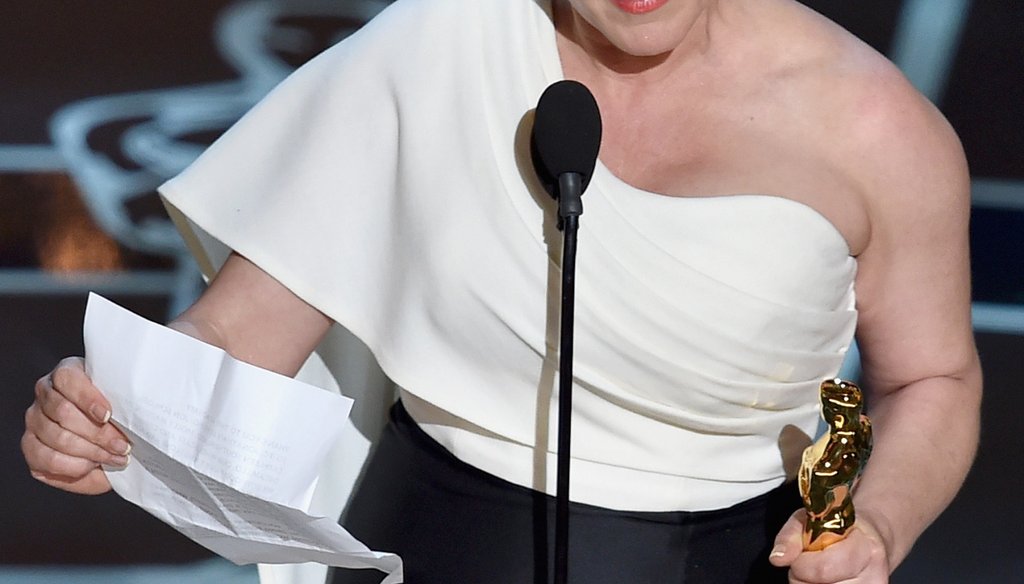Get PolitiFact in your inbox.

Actress Patricia Arquette accepts the award for Best Supporting Actress during the 87th Annual Academy Awards on Feb. 22, 2015. Photo by Getty Images
On Sunday night, decked out in reading glasses and a single-shoulder gown, actress Patricia Arquette used her Oscar acceptance speech to call for equal pay for women.
"To every woman who gave birth, to every taxpayer and citizen of this nation, we have fought for everybody else’s equal rights," she said. "It’s our time to have wage equality once and for all, and equal rights for women in the United States of America."
Arquette’s decision to elaborate backstage after irked some on the left, even as Democrats from President Obama on down emphasized the "gender wage gap" during last year’s midterm elections.
The fact is, there is a wage gap between men and women. The divide varies, though, based on how different reports adjust for factors such as hours worked or job performed.
Below is a deeper dive on some of the wage-gap claims, and the tricky semantics that Arquette now knows surround them.
A PRESIDENTIAL EXAGGERATION
Former President Jimmy Carter missed some of the nuance in the wage-gap debate when he said women get 23 percent less pay than men "for the same exact work."
Experts agree there is a gender-based wage gap. Carter was citing a U.S. Census bureau report showing women’s total wages were about 23 percent less than that of men.
But PolitiFact Georgia found that hours worked played into the discrepancy, important context to understand the study's findings. We rated the claim Mostly False.
AVOID SPECIFICS AND BROADER CLAIM IS RIGHT
Last spring, Senate Democrats failed to get enough votes to break a Republican filibuster blocking the Paycheck Fairness Act, which among other things, would require the federal Equal Employment Opportunity Commission to collect data about pay from employers.
Michelle Nunn was among Democrats who said the bill would help women earn the same wages as men.
"On average, women make 77 cents for every dollar men make," Nunn wrote on her Facebook page, just before announcing she would run for U.S. Senate in Georgia.
Nunn, who went on to lose the race to Republican David Perdue,was referring to the same Census report that tripped up others.
But by using the qualifier "on average" and not implying the gap was for the same jobs, she was more in line with that study’s findings.
We rated her statement Mostly True.
DETAILS MAKE SIMPLE COMPARISONS DIFFICULT
Connie Stokes’ failed bid for lieutenant governor made her one a handful of female candidates (all Democrats, save for the Libertarian choice for U.S. Senate) for statewide office last year.
In a fundraising letter, she raised the issue that women earn less than men this way:
"There appears to be some discrepancy about the difference in the amount of money women are paid compared to men," Stokes wrote. "You know it does not matter what the difference is, women are paid less than men for the same work, period."
The data back up her broad claim, that men earn more than women.
But rigorous studies have found women make about 93 cents on a man’s dollar when job, experience and hours of work are all comparable.
And a 2011 Bureau of Labor Statistics found three jobs – in food preparation/serving industries, "billing and posting clerks and machine operators" and store clerks – where women earn more than men.
In other words, differences in choices such as occupation pursuits and hours worked can make simple comparisons tricky.
We rated Stokes’ claim Half True.
Our Sources
See individual reports.












































